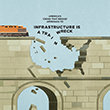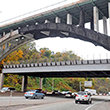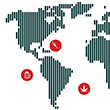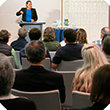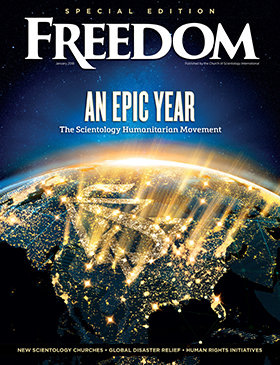
Donald Rumsfeld, certainly not an oratorical jockey, in 2002 told reporters: “There are also unknown unknowns—the ones we don’t know we don’t know.”
The then-Secretary of Defense, in his jihad against the English language, was spinning government hawks’ claims that Saddam Hussein had weapons of mass destruction. Rummy was dreadfully and lethally wrong.
But if he was culpable, sheep like reporters credulous of government fairy tales were willing accomplices. Journalists seldom investigate their profession’s own failures, unless they can pile on to someone who has egregiously besmirched the profession—NBC’s Brian Williams and Rolling Stone’s Sabrina Rubin Erdely in recent months. Those miscreants are depicted as rare rotten apples in an otherwise pristine business.
But those sins are venial compared to the outrages perpetrated by entire media groups. Have you seen The Washington Post dig into the corrosive connections between the newspaper’s owner, Amazon founder Jeff Bezos, and his $600 million cloud computing deal with the CIA? The potential conflict of interest is stunning.
The fear of the press carrying water for the CIA is not new. Carl Bernstein, half of the Post’s two-reporter Watergate team and now a vigorous media critic, has written: “The use of journalists has been among the most productive means of intelligence gathering employed by the CIA.”
There is irony that a Post reporter, Jason Rezaian, is on trial in Iran for espionage. When so many reporters have been on the payroll of Spook Central, it provides foes of America a pretext to capture innocent journalists as pawns.
As the financial collapse of mainstream media has accelerated, the opportunity for people to engage in shady reality manipulation has soared.
One study calculated that, from 2007 to 2011, 39,806 journalism jobs had been eliminated. The numbers continue to tumble, with The Wall Street Journal the latest to downsize and reconfigure, laying off dozens of editorial staff and closing two foreign bureaus in mid-June.
Meanwhile, public relations practitioners doubled from 45,000 to 90,000 between 1980 and 2010.
An astounding 62 percent of journalists concede their primary source of information is PR spin. It’s no wonder that distrust of the media has reached a new high, 60 percent of the public. That trend convergence signifies one thing: What you read in the “news” is often bought and paid for just like advertising copy.
And now CNN has gone headlong into the “branded content” business with a new studio to produce ‘advertorial’ for paying clients—ads that look like news (a move they declare “courageous”).
Now that’s spin.
“This isn’t about confusing editorial with advertising,” insists CNN executive Dan Reiss. “We’re not here to blur the lines.” Right.
The Arab Spring four years ago created ripe fruit for media to pluck. On the other hand, some news organizations—notably CNN—used the opportunity to get fat off dictators.
CNN’s international division, CNNi, produced a stunning documentary on Bahrain’s tyrannical regime by veteran journalist Amber Lyon, who had been threatened by the nation’s security thugs during filming. While that documentary aired once in America (and won numerous accolades and prizes), CNNi refused to air it outside the U.S., notably in the Middle East.
Why? Glenn Greenwald, a columnist for Britain’s Guardian newspaper, disclosed CNNi has pursued “journalistically dubious ways to earn revenue from governments around the world. Bahrain has been one of the most aggressive government exploiters of the opportunities presented by CNNi.” Greenwald detailed Bahrain’s $32 million in payments to U.S. public relations firms—much of it aimed at influencing American media to whitewash Bahraini oppression during the Arab Spring.
A look at Wolf Blitzer’s “Situation Room” documents a preponderance of “experts” clamoring for war and mayhem against Iran—many of the same chattering heads who ramped up propaganda to attack Iraq.
Many pundits are covert paid shills. Ed Rogers is a Washington, D.C., fixture—the sort who smoothly transitions from government to lobbying. In April, Rogers unleashed a broadside in The Washington Post castigating President Obama for depicting global warming as a dire threat. The Post did not disclose that Rogers is a lobbyist for oil and gas companies.
The efficiency of conning the public reached new highs (or lows) when it was revealed that three columnists—Armstrong Williams, Maggie Gallagher and Michael McManus—had been handsomely paid by the Bush Administration to tout such initiatives as the now widely discredited No Child Left Behind.
Sound, truthful information is necessary for freedom and democracy to survive. With the U.S. Supreme Court’s decisions unleashing torrents of money from anonymous donors into elections campaigns, and with media messages more and more susceptible to toxic influences, the outlook for the nation appears bleak.
Great journalism requires two factors: multiple and robust players. Multiple still exists, but dwindling numbers of owners are being replaced by mega-opolies. And robust journalism already has largely folded its tents. It’s exactly the sort of news environment tailored for corruption, plutocracy and totalitarianism.
Florida Freedom Editor John F. Sugg, is a winner of the Society of Professional Journalists Green Eyeshade Award for serious commentary, and more than three dozen other citations for journalism excellence.

